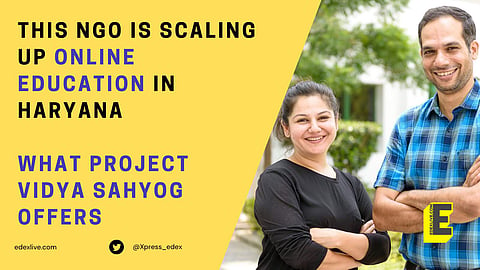

The Haryana Education Department has roped in the Lotus Petal Foundation to harness digital technology and teaching with the aim of enhancing learning outcomes at government schools. A not-for-profit organisation, the Lotus Petal Foundation has been assigned 41 out of the 78 Sanskriti Model Primary Schools in the Gurugram region under its Vidya Sahyog project. The focus initially will be on developing the digital infrastructure of the schools, including the provision of technology such as microphones, webcams, tablets and stable internet connectivity. The programme will kick off with English as the major subject and classes will include theatre and art in interactive sessions that are beamed live to the schools.
"This will be a departure from the way online education is being conducted for students of government schools, with the help of pre-recorded content. Here, the focus is on the interaction between the students and the teachers. All our teachers are provided with tablets on which they can write as if on a whiteboard, and the same will appear for the students on the screen, making the entire experience more lively," says Kushal Chakravorty, who co-founded LDP in 2011. The foundation runs the Vidyananda School for underprivileged kids in Gurugram from Nursery to Class XII, as well as provides the students with healthcare and nutrition.
The Vidya Sahyog programme was conceptualised back in 2018 and, last year, it was structured as a means to supplement government school teachers. In September 2021, the government of Haryana was approached and the LPF was provided a sanction to undertake the project. "It is an important public-private partnership. The government can provide us with infrastructure in terms of schools and high figures of enrollment of children. NGOs have the capability of teaching them and fast-track interventions with the knowledge of education technology," believes Chakravorty.
While the foundation equips the schools with digital infrastructure, it also ensures that the students and faculty are able to deploy the technology by training them at their campus. A bridge programme has also been organised for students who have been alienated from the education system due to the pandemic. Apart from this, in order to bring students up to speed with their learning levels, fastrack courses have also been put in place to deal with core concepts. "We have been able to get almost 100 students back on track in the last six months," claims Chakravorty.
An interesting aspect of the programme, that Chakravorty highlights, is that uplifting the educational infrastructure of government schools will impact the education of girls in the region as well. "Many a times, parents from financially challenged backgrounds send the boy child of the house to a decent private school, thinking he will be the one to have a career. On the other hand, girls are enrolled in government schools in order to save costs. By boosting the quality of education in these schools, it will help girl students discover better opportunities. We will also have counsellors on board in order to guide them through various possible career choices," he adds.
The foundation is also keen on building infrastructure to aid teachers in the trade of digital education. Right from soundproof rooms, ergonomic chairs and high functioning tablets and systems, Chakravorty says the foundation is putting in place these facilities at their campus in Gurugram and a new school is also in the works. While Chakravorty believes that each school should ideally have a computer lab, he is aware that the usage of these labs in the current scenario might not be optimal. LPF's solution to the gaps in digital literacy in government schools is a mobile van for e-learning, fully equipped with laptops and other required gadgets that will take digital education to these schools at a frequency of about twice a week to train students in the area.
